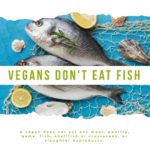Can Vegans Eat Insects?
Unveiling the Ethical and Environmental Implications
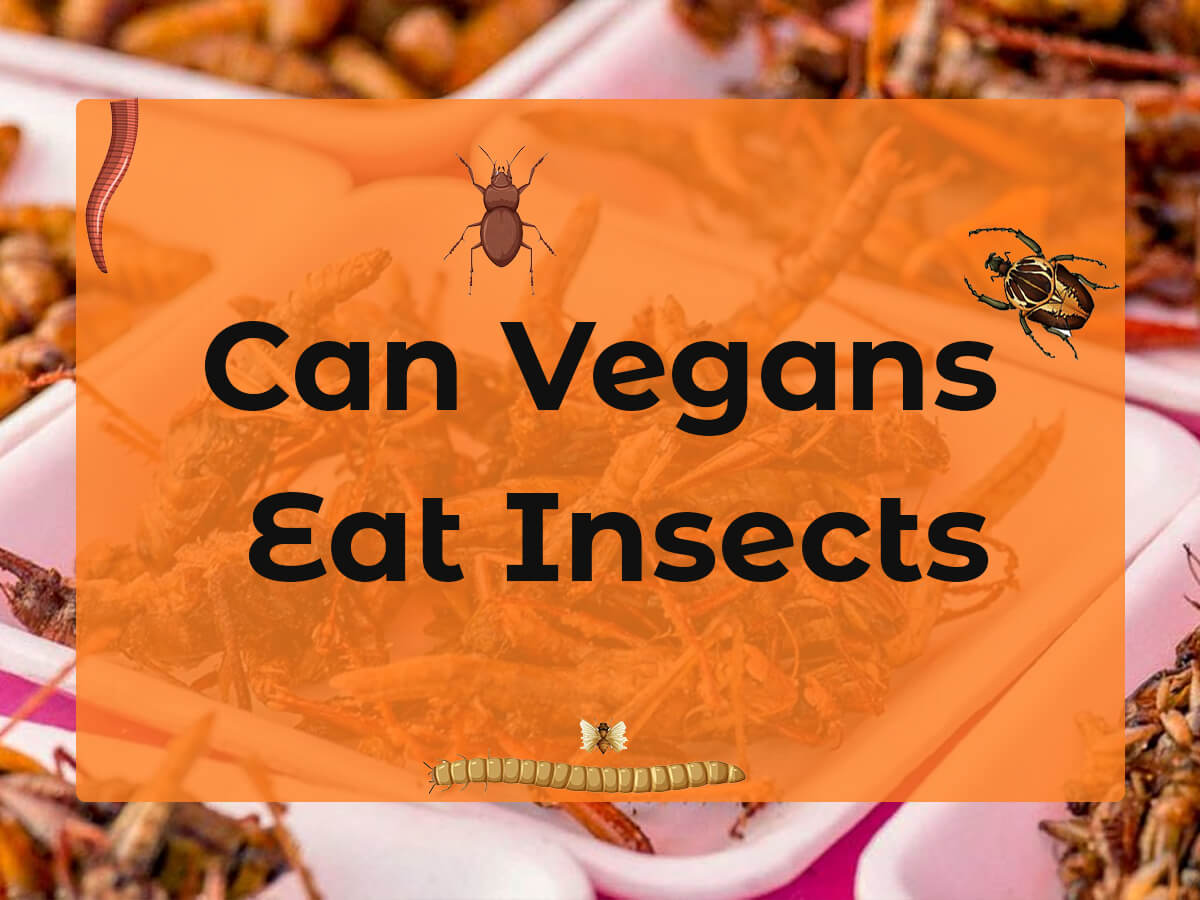
Are you ready to explore a fascinating topic that will challenge your perception of vegetarianism and alternative protein sources? If you’re curious about incorporating insects into a vegetarian diet, this article is for you!
As a vegan who truly cares about the environment and animal rights, I’m passionate about making the world a better place for animals and the environment; one way I do that is by following a plant-based diet, also known as veganism.
When discussing vegetarianism, we’re delving into a lifestyle about making compassionate and sustainable choices. It’s a way of life that has gained significant traction over the years, for good reason! People all around the globe are recognizing the need to move away from the conventional meat-centric diet and explore alternative protein sources.
This brings us to a fascinating question: Can vegetarians incorporate insects into their diet? It might initially sound surprising, but we’re here to explore all possibilities.
Join me as we dive into the world of vegetarianism, examine the concept of eating insects, and unravel the ethical considerations surrounding this topic.
First things first, let’s know the concept of vegetarianism. Vegetarianism is all about avoiding animal products and embracing a diet rich in fruits, vegetables, whole grains, and legumes. There are different forms of vegetarianism, ranging from lacto-ovo-vegetarian (who eat dairy and eggs) to vegan (who avoid all animal products). While these forms may differ in their specifics, they all share one common principle: avoiding animal flesh.
Curious about the distinctions between vegan and vegetarian diets? Explore the contrasting philosophies, food choices, and health impacts in this comprehensive article : Vegan VS Vegetarian Differences Between Vegan And Vegetarian
As a vegan, I’m particularly drawn to the idea of avoiding any form of animal exploitation or harm. That means resounding “No” to meat, seafood, and other flesh. It’s about extending compassion to all sentient beings and reducing my environmental impact.
Now, let’s talk about insects. These little critters have been gaining attention as a potential alternative protein source. They’re abundant, reproduce quickly, and require fewer resources than traditional livestock. But the big question remains: Can we, as vegans, consider insects as part of our diet?
In this article you will read:
The story of eating insects
In many parts of the world, insects have been a major food source for centuries. Insects are considered a delicacy in places like Thailand, Mexico, and Africa. They are fried, seasoned, and served on a plate garnished with vegetables or pilaf.
I remember the first time I heard about people eating insects – I was like, “Eww, gross!” But the more I learned about it, the more fascinated I became.
People have been snacking on crunchy grasshoppers in Mexico, chewing on fried silkworm pupae in Korea, and savoring roasted ants in Africa for generations.
In fact, entomophagy (the practice of eating insects) is estimated to be a part of the traditional diets of at least 2 billion people worldwide.
For many, the idea of snacking on crickets or mealworms still seems out there.
However, with the rise of sustainable eating and a growing interest in alternative protein sources, insects are making their way onto more plates.
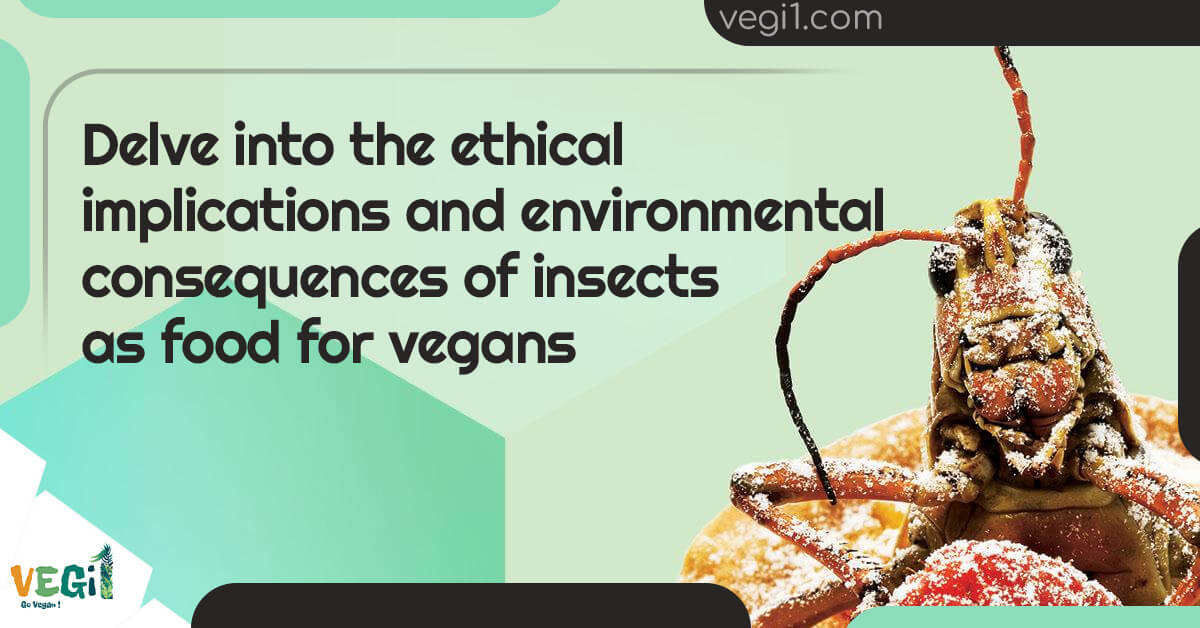
The debate over insects as a food source: Can Insects Alternative Protein Sources
Lately, there’s been a lot of buzz around alternative protein sources, like insects. With the increasing demand for sustainable food options, people are exploring new ways of incorporating protein into their diets without relying on meat.
There are conflicting opinions regarding the benefits and risks of incorporating insects into a vegetarian diet.
One argument is that insects could be a sustainable protein option, reducing our reliance on resource-intensive livestock. They see it as an opportunity to address global food needs without harming the environment.
In a world where climate change is a significant concern, finding sustainable protein sources is more important than ever. Insects require far fewer resources to raise than traditional livestock and produce far fewer greenhouse gases.
Conversely, there are also ethical concerns surrounding the consumption of insects.
Vegans believe that insects are sentient beings capable of feeling pain and suffering and should not be exploited for food.
But, Some people argue that it’s impossible to know for sure whether insects are capable of experiencing pain and that their simplicity of nervous systems means they are less likely to suffer than more complex animals like cows or pigs.
Personally, I believe insects, too, have their place in the delicate balance of our ecosystem, and it’s important to treat all living beings with respect and compassion, whether they’re cows or crickets.
So, my answer to “Can vegans eat bugs” is definitely “No.”
In the next section, I will explore some ethical considerations of eating insects.
Keep reading to know why vegans can’t eat insects!
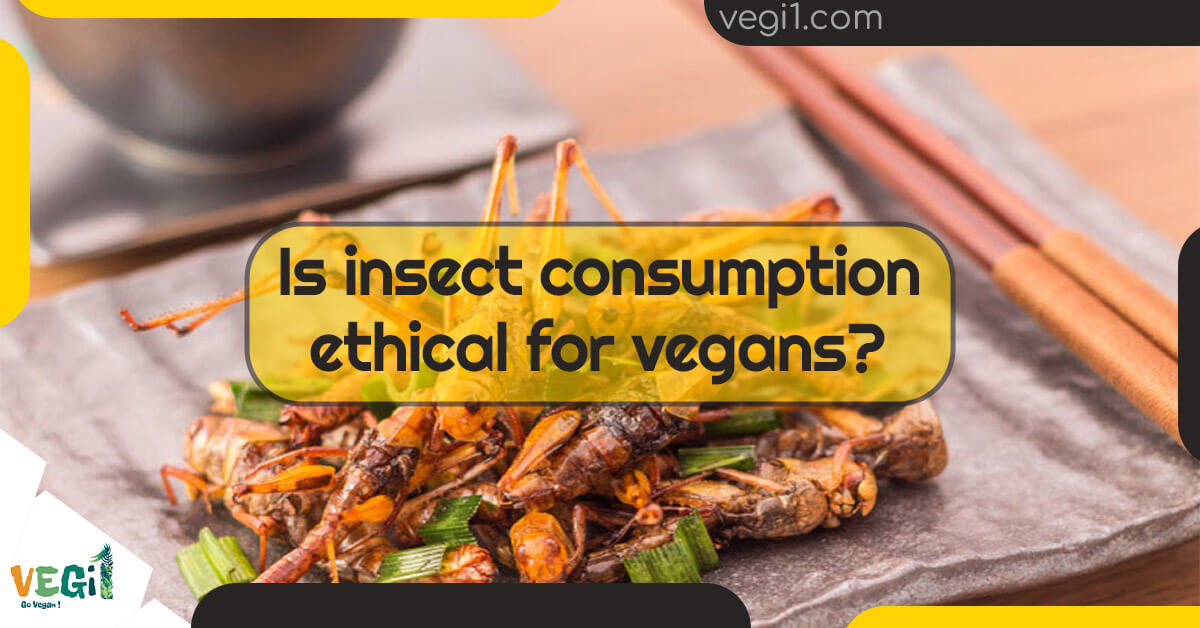
The ethical considerations of eating insects
When it comes to the ethical considerations of eating insects by vegans, there are definitely some things to think about.
Insects belong to the phylum Arthropoda, which means they have jointed legs and an exoskeleton.
They may not be as cuddly as a kitten or as majestic as a horse, but they are still animals that play an important role in our ecosystem.
Some may argue that insects don’t deserve the same level of consideration because they are so different from mammals or birds.
But to me, that’s like saying that dogs are more important than cats because they’re more similar to humans.
As I mentioned earlier, I believe living beings deserve to be treated with compassion, regardless of their appearance or genetic makeup.
As vegetarians, we aim to avoid all forms of animal flesh, including our tiny six-legged friends.
We’re all about creating a world where animals are treated respectfully and compassionately. That means saying no to any form of animal exploitation, whether on a massive scale or the tiniest bites. Our goal is to promote a lifestyle that values the well-being of all living creatures.
Finally, While insects may be a sustainable and protein-rich alternative to traditional livestock, they are still living beings with the capacity to feel pain and suffer. As a vegetarian who cares about animal welfare, I choose not to contribute to their exploitation and consumption.
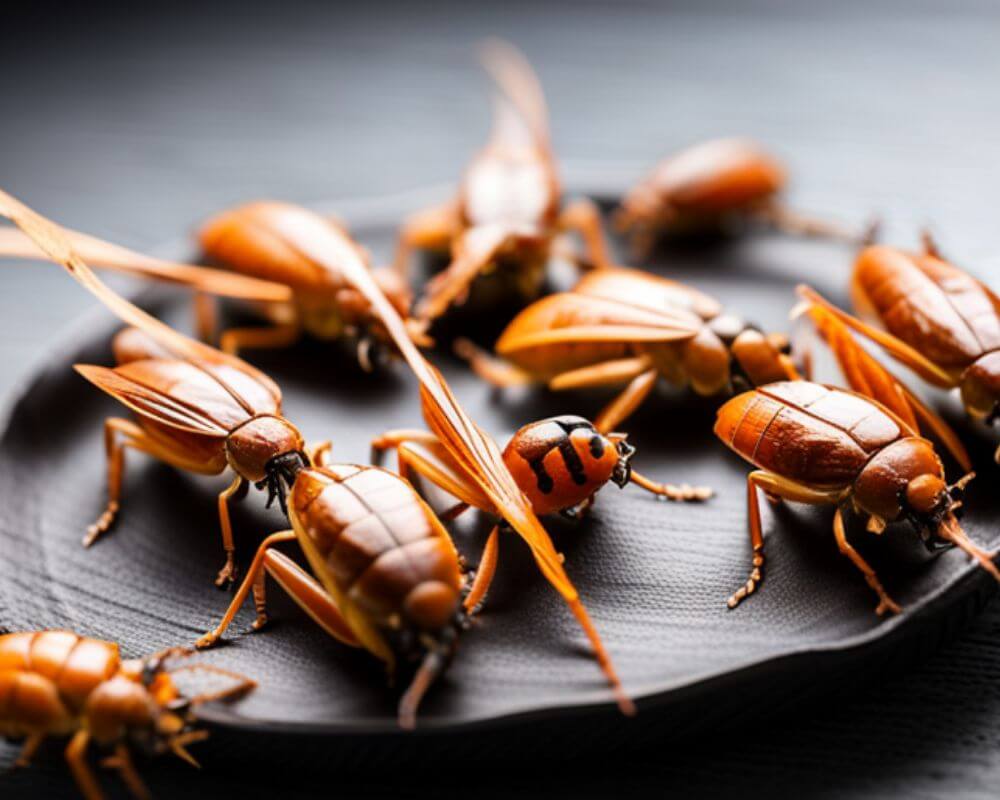
The health effects of consuming insects on the body
One of the main concerns with consuming insects is the risk of contamination. Insects can carry harmful bacteria and viruses, such as salmonella and E. coli, that can cause food poisoning and other health problems. Since insects are often collected from the wild or bred in uncontrolled environments, there is a higher risk of contamination than conventional livestock.
Additionally, there is a risk of allergic reactions to insect proteins. Some people may have a pre-existing allergy to certain types of insects, which can cause severe reactions. It’s important to note that insect allergies are not as widely studied as other food allergies. So, the risk is not well understood.
Another concern with consuming insects is the potential dangers associated with harvesting them. Some methods of insect collection, such as using pesticides or collecting from contaminated areas, can introduce harmful chemicals into the food chain. These chemicals can accumulate in the insects and risk human health.
Do vegans/vegetarians kill insects? The impact of insect-killing in plant-based diets and how to navigate the moral dilemma as a vegan or vegetarian.
Consequences and environmental effects of eating insects as food
Another ethical consideration is the impact that mass insect farming could have on the environment.
While insects are incredibly sustainable and require far fewer resources to raise than traditional livestock, it’s important to consider the potential negative consequences of large-scale insect farming.
From an environmental standpoint, insects might have a smaller carbon footprint than traditional livestock. However, let’s remember that plenty of plant-based protein options can meet our nutritional needs without compromising our vegetarian values. We can fuel our bodies and nourish our souls while staying true to our commitment to animal rights.
So, my fellow herbivores, let’s stick to our greens, beans, and tofu delights! By embracing a vegetarian diet, we’re positively impacting the world. We’re reducing animal suffering, minimizing our ecological footprint, and showing the world that compassion can be truly delicious.

10 Alternatives to insect consumption for vegans
As a dedicated vegetarian who cares deeply about the environment and animal rights, I always seek delicious and cruelty-free options to satisfy my protein needs. So, After discussing insects’ ethical considerations, if you decide to not eat insects and are not quite ready to embrace the idea of eating bugs, don’t worry – there are plenty of alternatives out there!
Here are ten fantastic alternatives that will have your taste buds dancing with joy:
- Legumes Galore: Beans, lentils, and chickpeas are my go-to protein powerhouses. They’re versatile, packed with nutrients, and can be transformed into mouthwatering dishes like hearty stews, flavorful curries, or even veggie burgers.
- Tempeh Triumph: Made from fermented soybeans, tempeh is a fantastic meat substitute. It’s got a nutty flavor and a firm texture that makes it perfect for stir-fries, sandwiches, or even grilled as a tasty BBQ option.
- Tofu Time: Ah, good old tofu! This soy-based wonder is like a blank canvas waiting to be transformed into whatever your heart desires. Marinate, grill, stir-fry, or blend it into creamy dressings and sauces—the possibilities are endless.
- Seitan Sensation: If you have yet to try seitan, you’re in for a treat. It is made from wheat gluten and has a meaty texture that makes it a popular choice for vegan versions of classics like sausages, deli slices, and even “chicken” nuggets.
- Quinoa Quirkiness: Quinoa is a complete protein and a versatile grain that can be the star of your meals. Whip up a refreshing quinoa salad, cook it as a side dish, or use it as a stuffing for peppers or mushrooms.
- Nutty Goodness: Nuts and nut butter are delicious and packed with protein and healthy fats. Snack on them, sprinkle them on salads or blend them into creamy sauces—nuts are our little taste buddies.
- Power-Packed Seeds: Chia, hemp, flax, and sunflower seeds are like little nutrient bombs. Sprinkle them on smoothie bowls, add them to baking recipes, or use them as a crunchy topping for salads.
- Spirulina Splendor: This vibrant blue-green alga is a nutritional powerhouse and a protein-rich superfood. Blend it into smoothies or add it to your favorite energy bites for an extra boost.
- Edamame Excitement: These young soybeans are fun to pop out of their pods and make a fantastic snack or appetizer. Boil or steam them, sprinkle some salt, and enjoy!
- Veggie Variety: Last but not least, let’s not forget the wide array of vegetables that can provide plenty of protein. Broccoli, spinach, Brussels sprouts, and kale are just a few examples of our green allies.
So, my friend, there you have it, excellent alternatives to insect consumption for us vegans. With these plant-based powerhouses, we can nourish ourselves, protect the environment, and stand up for animal rights—all while enjoying some delicious eats.
Remember, being a vegan is all about embracing compassion and making choices that align with our values. And with these alternatives, we can continue to rock our vegetarian lifestyle with pride.
Keep exploring, experimenting, and being the change you wish to see in the world!
In the end
So, after all this discussion, what’s the verdict? Can vegans eat insects?
Well, it’s ultimately up to each individual to decide for themselves.
My fellow vegetarian pals, it’s up to us to make the right choices for us, our values, and our taste buds. We’re on a mission to protect animals and the environment, and plenty of other sustainable protein sources don’t involve our tiny six-legged friends.
Let’s celebrate the bounty of plant-based goodness that surrounds us and continue making a positive impact in our own unique way. We can nourish ourselves and the planet, one plant-based meal at a time.
Remember, my friends, each choice we make has the potential to create a brighter, more compassionate world. Let’s embrace our vegan lifestyle with open hearts and open minds. Together, we can make a real difference.
Don’t forget to share your thoughts in the comments below the article, I can’t wait to hear what you think!


